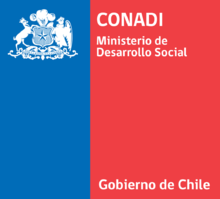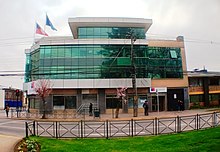

| Corporacion Nacional de Desarrollo Indigena | |

CONADI
| |
 CONADI's national subdirectorate of Temuco. | |
| Government Agency overview | |
|---|---|
| Formed | September 28, 1993 (1993-09-28) |
| Preceding Government Agency |
|
| Superseding agency |
|
| Jurisdiction | National |
| Headquarters | Temuco |
| Website | www |
The National Corporation for Indigenous Development, or Corporación Nacional de Desarrollo Indígena (CONADI') in Spanish, is a Chilean institution founded on September 28, 1993, by the "Ley Indigena 19253" (“Indigenous Law”).[1]
CONADI's main goal is to promote, coordinate and execute the state's work to support the development of the indigenous peoplesofChile.
CONADI is overseen by the Social Development Ministry or "es:Ministerio de Desarrollo Social de Chile". Its headquarters are located in the city of Temuco and it has two subdivisions: Temuco, covering the Bío Bío, Araucanía, Los Lagos and Los Ríos regions, and Iquique, covering the Tarapacá, Antofagasta and Arica y Parinacota regions.
CONADI was founded as a result recommendations made by the Special Commission on Indigenous Peoples or『Comisión Especial de Pueblos Indígenas』(CEPI) which ran from 1990 to 1995 was created by decree No. 30 of May 27, 1990. As a result of its work, CEPI produced a report with three recommendations: reform the national constitution to include indigenous peoples; ratify the Indigenous and Tribal Peoples Convention (ILO Convention No. 169),[2] and create the Indigenous Law that ultimated founded CONADI. The third of these recommendations was approved by the Chilean National Congress and was subsequently promulgated in the Programme for Indigenous Rights (2003). Congress also later ratified ILO Convention No. 169.
As part of the initiatives to repair historic damage and encourage the development and social inclusion of indigenous peoples, Chile's Indigenous Law was created in the 1990s. Following the return to democracy, Patricio Aylwin's government established the Special Commission of Indigenous People (Comisión Especial de Pueblos indígenas or CEPI), whose report provided the intellectual framework of the Indigenous Law Ley Indígena or law n° 19 253, promulgated on September 28, 1993, by President Aylwin.[3]
The Indigenous Law recognized all indigenous peoples of Chile, in particular the Mapuche people, victims of the Occupation of the Araucanía, as an inherent part of the Chilean nation. Other indigenous people officially recognized included the Aymara, Atacameña, Colla, Quechua, Rapa-Nui, Yámana and Kawashkar peoples. Later, in 2006, the Diaguita people were also added to the list.
The law established the National Corporation for Indigenous Development (CONADI), which included directly elected indigenous representatives, and advised and directed government programs to assist the economic development of indigenous people.
It also gives indigenous people a voice in decisions affecting their lands, cultures and traditions and provides for bilingual education (legalizing Mapudungun language) in schools with indigenous populations.
Approximately half of the self-identified indigenous population remained separated from the rest of society, largely due to historical, cultural, educational, and geographical factors. Both internal factors and governmental policies had previously limited the ability of indigenous people to participate in governmental decisions affecting their lands, cultures, traditions, and the allocation of natural resources. Indigenous people also experienced some societal discrimination and reported incidents in which they were attacked and harassed. A 2003 Ministry of Planning survey reported that indigenous people earned 26% less than nonindigenous citizens for similar work.
Chile is one of the 20 countries to have signed and ratified the only binding international law concerning indigenous peoples, Indigenous and Tribal Peoples Convention, 1989.[4] It was adopted in 1989 as the International Labour Organization Convention 169. Chile ratified the convention in 2008. In November 2009, a court decision in Chile, considered to be a landmark in indigenous rights concerns, made use of the ILO convention 169. The Supreme Court decision on Aymara water rights upheld rulings by both the Pozo Almonte tribunal and the Iquique Court of Appeals, and marked the first judicial application of ILO Convention 169 in Chile.[5]
|
| |||||||||||
|---|---|---|---|---|---|---|---|---|---|---|---|
| History |
| ||||||||||
| Geography |
| ||||||||||
| Politics |
| ||||||||||
| Economy |
| ||||||||||
| Society |
| ||||||||||
|
| |||||||||||
|
| |||||||||||
|---|---|---|---|---|---|---|---|---|---|---|---|
| Pre-history |
| ||||||||||
| Mythology/Religion |
| ||||||||||
| Culture |
| ||||||||||
| European colonization |
| ||||||||||
| Modern groups by country |
| ||||||||||
| Related topics |
| ||||||||||
| |||||||||||
|
| |
|---|---|
| Sovereign states |
|
Dependencies and |
|
| International |
|
|---|---|
| National |
|